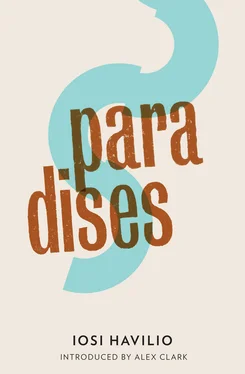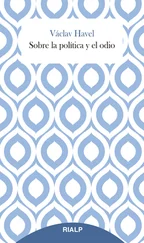Iosi Havilio - Paradises
Здесь есть возможность читать онлайн «Iosi Havilio - Paradises» весь текст электронной книги совершенно бесплатно (целиком полную версию без сокращений). В некоторых случаях можно слушать аудио, скачать через торрент в формате fb2 и присутствует краткое содержание. Год выпуска: 2013, Издательство: And Other Stories, Жанр: Современная проза, на английском языке. Описание произведения, (предисловие) а так же отзывы посетителей доступны на портале библиотеки ЛибКат.
- Название:Paradises
- Автор:
- Издательство:And Other Stories
- Жанр:
- Год:2013
- ISBN:нет данных
- Рейтинг книги:3 / 5. Голосов: 1
-
Избранное:Добавить в избранное
- Отзывы:
-
Ваша оценка:
- 60
- 1
- 2
- 3
- 4
- 5
Paradises: краткое содержание, описание и аннотация
Предлагаем к чтению аннотацию, описание, краткое содержание или предисловие (зависит от того, что написал сам автор книги «Paradises»). Если вы не нашли необходимую информацию о книге — напишите в комментариях, мы постараемся отыскать её.
is an almost perfect novel." — Albert Camus's
reimagined with a female lead in in twenty-first-century Buenos Aires.
Recently widowed, a young woman leaves the countryside for Buenos Aires with her four-year-old son where she seeks to build a new life for herself. She finds work in the zoo and moves into the human zoo of a squatted tower block at the invitation of one of its residents, to whom she acts as nurse, giving morphine injections.
Paradises — читать онлайн бесплатно полную книгу (весь текст) целиком
Ниже представлен текст книги, разбитый по страницам. Система сохранения места последней прочитанной страницы, позволяет с удобством читать онлайн бесплатно книгу «Paradises», без необходимости каждый раз заново искать на чём Вы остановились. Поставьте закладку, и сможете в любой момент перейти на страницу, на которой закончили чтение.
Интервал:
Закладка:
Now, for the last few days, I’ve been studying the crocodilians. I already know them more or less by heart. Alligators, whether Chinese or North American, are less aggressive than crocodiles, they only attack for food. They eat fish, small mammals, birds, tortoises and, in some cases, carrion. They are also distinguished from crocodiles by their lower jaw, which wedges right against the upper, hiding the fourth tooth. The adults are dark green and the young, black. Like cats and dogs they have a third eyelid, that white membrane that slides over the eye making them look like extraterrestrials. Among the Yacare caimans, the male and the female share their tasks equally: they build the nest together, they care for the eggs and protect their young. Their diet varies as they grow and depending on the season. Newborns feed on insects, amphibians and snails. This is the most southerly of the caiman family.
After eight days and fifteen injections, Tosca proposes a deal. First, without my asking, because she must have seen me looking at the picture on the first day and she’s beginning to like me, she tells me the story of the Virgin of Tears. She thinks it was in 1953, but it could have been ’52 or ’54, she can’t remember any more, she had just turned fourteen, she’s sure about that. So it had to be ’53; I was born in ’39, the day the war began. Tosca, her father and her sister Violeta — her mother had died of tuberculosis the previous winter — travelled to Syracuse on a pilgrimage when talk of the miracle began to circulate. A humble woman from a family called Fangasso had suddenly gone blind during pregnancy. But the blindness lasted less than a week. On the seventh day, she recovered her sight. And the first thing she saw when she woke up was the plaster Virgin she had been given for her wedding with tears falling down its cheeks. One just like this, Tosca tells me in a fit of enthusiasm, pointing at the image hanging on the wall. The miracle lasted a month, many people had the opportunity to see it for themselves: the Fangasso family, pilgrims, priests from neighbouring parishes, even an investigating commission sent by the Vatican to accredit the miracle. The Virgin cried ceaselessly. Lagrimi humani , says Tosca, who was a witness.
She finishes her story, we go through the morphine ceremony and, five minutes later, revived from the initial effects, she speaks again: There’s an empty flat on the third floor. And she stops there, she closes her eyes as if to sleep and leave me guessing. But no, she half opens them, rather sleepily: If you want you can stay there in exchange for continuing with the injections. As long as you keep it between us, because if the other nobodies find out they’ll all come crying to me. The only thing you’ll have to pay is your share of the electricity and the gas, and sort out the water with Benito. Thanks, I say although I’m not sure. You can stay here tonight after seeing me, you think about it. I nod. Benito accompanies me to the door and I’m about to ask him if he’ll take me to the third floor, if he’ll show me the apartment so I can get an idea of it before I decide, before I move in, but I can’t find the right words, he moves behind me like a giant shadow, unapproachable.
When I get back from the zoo, I tell Iris about Tosca’s proposal in the kitchen of the Fénix. Free accommodation, I say briefly. I tell her what I’ve been mulling over all afternoon. Anticipating her ill humour, I extend my hand and ask her to give me a moment. She purses her lips and raises her eyebrows, smelling betrayal. I tell her about Canetti, yes, she knows him well, and in fact she finds him disagreeable, I don’t like him, she says, and about Tosca, the old woman I’ve been giving injections to for a week, I say the old woman contemptuously, as if wanting in some way to soften the decision to leave. I also mention the building, a squat but not dangerous. Iris shrugs, as if she doesn’t care, with that mixture of annoyance and indifference that is so like her. A pause and the challenge: Why not come with us? I was thinking that if I tell Tosca she’ll surely agree to there being three of us. It’s all the same to her, I add, wanting to convince Iris. She looks at me perplexed, as if I’d invited her to a session of masochism.
During the time I spend packing my bag, Iris disappears. Offended or sad, she hides in her room. Night falls, Simón runs around the patio, twice I have to lean out of the window and shout at him to stop trying to climb the dividing wall. Now the question of tomorrow and the day after is circling round my head, I didn’t stop to think what I’m going to do with Simón when I go to work, who will look after him, because I don’t suppose Iris will do it once we’ve gone. I think that perhaps I was too hasty, I don’t even know what kind of place we’re going to end up in.
The Spaniard claims for one more night and we spend a while complicating things with the calendar until she’s convinced I’ve paid up until the following day. I don’t, however, manage to get her to return the hundred pesos I left as a deposit for the keys because she says the ones for the wardrobe are missing. Not that I insist. Iris shows her face again at the last minute, as if she’s been spying on us. She raises a hand from the end of the corridor and says, as if it were any old leave-taking: Tomorrow.
Nine
As well as being called the tower, the building is known to the locals as ‘el Buti’ because of someone who lived there and died resisting an eviction attempt ten years earlier, at the start of the occupation. A lad, they tell me, who went by that name. Sprayed on the staircase walls at the bottom of the lift shaft in really large red letters, carved on unpainted iron railings, over the rust, on the ceilings, on the doors, as well as the outside walls, even on the muck-covered pipes:
EL BUTI LIVES AND RESISTS
Until the night of the move, all I know of the place can be reduced to Tosca, the señora, as almost everyone calls her, and her world. That multi-use area of hers: bedroom, dining room and kitchen. The taxi drops us half a block away, the driver decides without asking that it’s better for us to get out there because otherwise he’ll have to go all the way round. I can’t work out whether he does it out of concern for my pocket, laziness or fear of attack. What’s clear is that I have to lug the suitcase and Simón, as well as a selection of bags that we have accumulated since we arrived in the city: tins of pâté, a packet of powdered milk, an extra towel that Iris lent me and insisted we take with us, damp clothes, my zoo uniform and the Albertus Seba book. At the door I say the same thing I do every day: I’m here to see the señora . I’m still no one, I don’t even have a number. The hooded boy, who sees me come in and out every night, who never says hi or bye, because that’s the way he is, not much of a talker, protecting himself with the loud music pumping through his earphones, this time he can’t help making a gesture of surprise, seeing me appear with another person and all my stuff. In fact he gets slightly worried and, instead of staying at his post as usual, he follows me. As if he wants to help me, or not, perhaps quite the opposite, to check that the señora is aware of my intentions.
I push on and knock at Tosca’s door. It doesn’t open for a while. I have to shout my name three times before I’m recognised. Come in, I finally hear. I push timidly; the bags and Simón remain in the doorway, distant but on view. You’re early, girl, Tosca tells me and I’m scared she’s forgotten her offer, that it’s all been a big mistake.
I’ve surprised them in the middle of a meal, stuffed flank steak with potato salad. Tosca and Benito never cook. They order from the deli: omelettes, chicken and chips, spring rolls. When it’s time for the injections, the little plastic trays holding leftover mash, the colourful smears of a Swiss roll, the empty pizza boxes or picked bones remain on the table and the quiet storm cloud of fried oil in the air can still be inhaled, even seen. Benito doesn’t register my presence, he chews standing up, spellbound in front of the television, squeezed into those overalls he never takes off, two or three sizes too small, as if he needs constant reassurance that he hasn’t grown. After a bite, perhaps because she has a suspicion, perhaps because she can see something in spite of the half-light, Tosca waves a hand for me to approach her. Her full mouth, false teeth flecked with egg, pork and carrot, is still able to say: You didn’t tell me you had a boy. My son, I say, pointing rather stupidly at Simón, as if I too had only just realised he was with me.
Читать дальшеИнтервал:
Закладка:
Похожие книги на «Paradises»
Представляем Вашему вниманию похожие книги на «Paradises» списком для выбора. Мы отобрали схожую по названию и смыслу литературу в надежде предоставить читателям больше вариантов отыскать новые, интересные, ещё непрочитанные произведения.
Обсуждение, отзывы о книге «Paradises» и просто собственные мнения читателей. Оставьте ваши комментарии, напишите, что Вы думаете о произведении, его смысле или главных героях. Укажите что конкретно понравилось, а что нет, и почему Вы так считаете.











